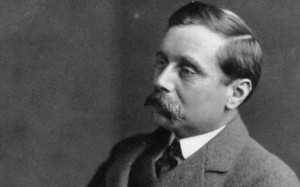You may be noticing a theme here. Barbara is letting me write another post about another science fiction author. I think she will be surprised at some of the colorful aspects of H.G. Wells’ life I uncovered in my research on him!
Herbert George Wells (Born: September 21, 1866 – Died: August 13, 1946) was an English author known for his prophetic science fiction novels and in later life his comic portrayals of lower class society. His parents were servants who had turned shopkeepers when they purchased a small store with an inheritance. The shop was not particularly successful and his father supplemented their income as a professional cricket player. When the shop failed and his father broke his thigh ending his career as a cricketer, his mother went back to work as a lady’s maid. As part of the employment agreement the father and children were not allowed to live with her. Herbert was placed as an apprentice to a draper. Long days and poor working conditions made this one of the worst periods of his life, but provided experiences he later wrote about in The Wheels of Chance and Kipps.
Herbert’s education was erratic and broad. He attended Thomas Morley’s Commercial Academy and then taught at the National School as a pupil-teacher (an advanced student who taught the younger children). When his sponsor was dismissed he had a short, unsuccessful apprenticeship as a chemist and eventually wound up as a pupil-teacher at the Midhurst Grammar school where his Latin proficiency and science had been remembered from a short stay a few years earlier. In 1884 he won a scholarship from the Normal School of Science (now part of the Imperial College London) where he studied biology and physics. He studied teaching at the College of Preceptors (teachers) and eventually earned a Bachelor of Science degree in zoology from the University of London External Programme.
In 1891 Herbert married his cousin Isabel Mary Wells. The marriage only lasted three years and they separated when he fell in love with one of his students Amy Catherine Robbins (Jane) who he married in 1895. He had two children with Jane, but with the full consent of Jane he preached and practiced a version of free love and fathered several other children with other women. H. G. Wells in Love: Postscript to An Experiment in Autobiography chronicles this portion of his life. At his request it was published 50 years after his death to protect the women in his life.
Politically Herbert was a socialist and who envisioned a classless world where everyone was judged by their merits, not their lineage. Many of his writings, especially later in life, were devoted to political themes. He was a strong proponent of the League of Nations (later the United Nations). His impact on politics was marginal but he did co-found Diabetes UK which is now the leading diabetes charity in the UK.
H. G. Wells was a prolific writer publishing both fiction and non-fiction. Few people know he wrote a biology textbook and eventually abandoned science fiction later in life for comic novels with discussions of social or political themes. What he is primarily know for are his science fiction works which have landed him firmly in contention as the “Father of Science Fiction”. He wrote many of these is a burst of energy between 1895 and 1904. These works include one of my all-time favorites “The Time Machine” along with “The Invisible Man”, “The Island of Doctor Moreau”, the “First Men on the Moon” and “The War of The Worlds”.
One of his short stories, “The Country of the Blind” is a tale of a man who is stranded in a valley where everyone is blind. Being able to see, he remembers the old adage “in the land of the blind the one eyed man will be king” and figures he has it made. Eventually he falls in love with one of the locals, but his petition to marry her is denied because of his obsession with “sight” that the residents of the valley cannot understand or grasp. They recommend having his eyes removed so he can become “normal”, but on the day of the operation he flees thinking it will be easy to avoid blind searchers, but it is not as easy as he thought. He sees that the valley is about to be destroyed by a rock slide, but they do not believe him. In the final version of the story rewritten in 1939 he escapes with the rock slide with his love. This is a short read and is really worth the time!
H. G. Wells’ works have been made into many blockbuster movies and other productions, but the most memorable of them was the October 30, 1938 radio production of “War of the Worlds” by Orson Welles. This was written as a newscast interrupting the regularly scheduled broadcast. It caused widespread panic among listeners and mass hysteria. You can see Herbert’s biology training showing through in that the world is saved not by military might, but by germs the Martians bodies cannot cope with.
I hope you have enjoyed this post. It barely scratches the surface of H. G. Wells’ life. Please comment if you would like to know more about this great science fiction author!
Jeff Jones

